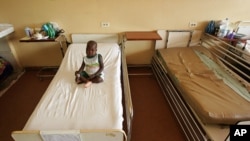DAKAR —
Low-cost health insurance is about to become available to Senegal's students and informal sector employees via the World Bank Group’s International Finance Corporation (IFC).
Nearly two-thirds of all Senegalese lack access to health insurance and many fall into debt when faced with an unexpected illness or accident.
IFC, in partnership with CIDR (Centre International de Developpement et de Recherche), says it plans to offer low-cost, private health insurance plans in Senegal as part of the region’s first private co-pay pilot program.
“The current state of play in most of West Africa is that private insurance companies can provide health insurance, but it’s extremely expensive when you compare it to the usual average incomes of people," said Tiphaine Crenn, an IFC operations officer. "About 65 percent of people [in Senegal] do not have any health care coverage whatsoever."
In Senegal, only civil service employees or workers at companies with more than 50 employees, are eligible to receive health care benefits. Crenn says this means many people rely on loans to cover unexpected health care costs.
“One thing that we see over and over again is what we call a health shock, so some kind of serious illness or accident that completely wipes out family savings, or they even have to borrow money to pay health costs," she said. "So it makes people extremely vulnerable. All they need is one massive health shock, and it sends them into complete precariousness, indebtedness."
The IFC says that it will work with six private Senegalese insurance companies to pool the costs of health risks and offer micro-healthcare products at well below normal costs.
Unlike other health care plans in Senegal, which run between $500 and $600 a year and are difficult to qualify for, the IFC program will offer plans as low as $16 per year.
Plans that include hospital visits will cost a maximum of $60 per year; for $3 per year, students can gain access to basic health care and pharmacy services if they get injured at school or on the way to school.
In exchange for the annual fees, participants will receive a health card that requires them to make a co-payment of just 20 percent of normal treatment or medication costs.
Crenn says such a system could change the future of health care in Africa.
“If it [a private co-pay system] really works, and if it can be replicated elsewhere, it would really help to fill in the gaps, because governments try to provide some health services," she said. "But what do individual people do to have access to affordable health care? That’s a big part of what is missing in this picture, so it could be a very important lesson for the region as a whole."
Crenn said the pilot program initially plans to target around 108,000 people in Dakar within three years, after which program will expand to Senegal’s Thies and St. Louis regions and possibly into neighboring countries.
Nearly two-thirds of all Senegalese lack access to health insurance and many fall into debt when faced with an unexpected illness or accident.
IFC, in partnership with CIDR (Centre International de Developpement et de Recherche), says it plans to offer low-cost, private health insurance plans in Senegal as part of the region’s first private co-pay pilot program.
“The current state of play in most of West Africa is that private insurance companies can provide health insurance, but it’s extremely expensive when you compare it to the usual average incomes of people," said Tiphaine Crenn, an IFC operations officer. "About 65 percent of people [in Senegal] do not have any health care coverage whatsoever."
In Senegal, only civil service employees or workers at companies with more than 50 employees, are eligible to receive health care benefits. Crenn says this means many people rely on loans to cover unexpected health care costs.
“One thing that we see over and over again is what we call a health shock, so some kind of serious illness or accident that completely wipes out family savings, or they even have to borrow money to pay health costs," she said. "So it makes people extremely vulnerable. All they need is one massive health shock, and it sends them into complete precariousness, indebtedness."
The IFC says that it will work with six private Senegalese insurance companies to pool the costs of health risks and offer micro-healthcare products at well below normal costs.
Unlike other health care plans in Senegal, which run between $500 and $600 a year and are difficult to qualify for, the IFC program will offer plans as low as $16 per year.
Plans that include hospital visits will cost a maximum of $60 per year; for $3 per year, students can gain access to basic health care and pharmacy services if they get injured at school or on the way to school.
In exchange for the annual fees, participants will receive a health card that requires them to make a co-payment of just 20 percent of normal treatment or medication costs.
Crenn says such a system could change the future of health care in Africa.
“If it [a private co-pay system] really works, and if it can be replicated elsewhere, it would really help to fill in the gaps, because governments try to provide some health services," she said. "But what do individual people do to have access to affordable health care? That’s a big part of what is missing in this picture, so it could be a very important lesson for the region as a whole."
Crenn said the pilot program initially plans to target around 108,000 people in Dakar within three years, after which program will expand to Senegal’s Thies and St. Louis regions and possibly into neighboring countries.




